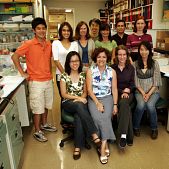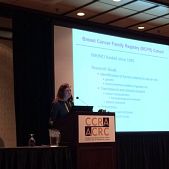
Pioneering work in breast cancer
Irene Andrulis is a molecular geneticist at the Samuel Lunenfeld Research Institute (SLRI) of Mount Sinai Hospital where she holds the Anne and Max Tanenbaum Chair in Molecular Medicine. She is a Professor in the Department of Molecular and Medical Genetics and in the Department of Laboratory Medicine and Pathobiology at the University of Toronto. She is co-head of the Fred A. Litwin Centre for Cancer Genetics at the SLRI and Director of the Ontario Cancer Genetics Network (OCGN).
She obtained her BA from the University of Pennsylvania in Biology and Psychology and her PhD from the University of California at Irvine in Molecular Biology and Biochemistry.
She is interested in the identification of factors associated with susceptibility, histopathology and prognosis of cancer. Her pioneering work in breast cancer is world-renowned.
Dr. Andrulis and her colleagues established that a genetic test could identify women with node negative breast cancer (cancer that has not metastasized to the lymph nodes) who are at increased risk of recurrence of the disease.
She is one of the 10 Greek scientists among the 418 researchers who participated in a new genomic study which identifies 12 genetic variations that raise the likelihood of epithelial ovarian cancer. Epithelial ovarian cancer (EOC) is the most common type of ovarian cancer. The results of the study were published in the journal Nature Genetics. The new study was conducted as part of the OncoArray Consortium in an attempt to identify the genetic background for most common cancers.
“My laboratory conducts multi-disciplinary studies to identify genetic alterations that play a role in breast cancer and sarcoma and to determine their clinical importance. Our goals are to explore the biology of these genetic alterations, to aid in diagnosis and treatment, and to discover novel targets for therapeutics”.
She was named a ‘Women of Action’ by the Israel Cancer Research Fund in 2007.











